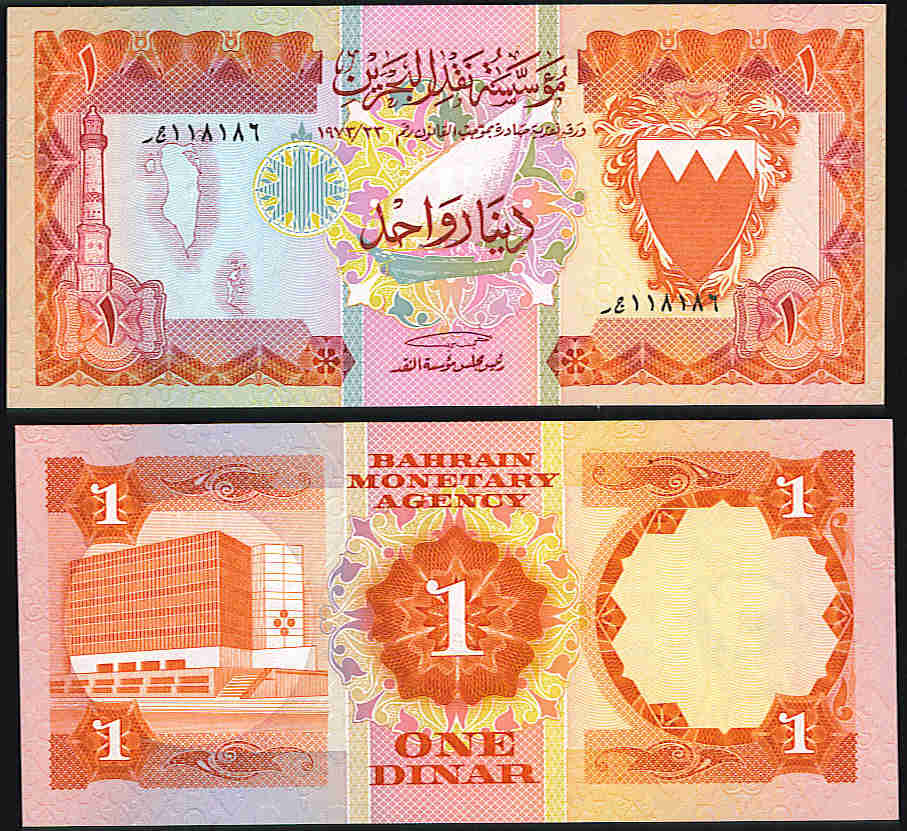'Arrogant' American Diplomats 'Anger' People of Bahrain [Part II]
In Part II of this op-ed article from the Akhbar Al Khalij newspaper of Bahrain, the author tells of his suspicions that the U.S. Embassy in Bahrain interfered in a debate to keep him from participating, due to his consistant and vociferous criticism of American policy.
By Mohammad Kazem
Translated By Nicolas Dagher
March 6, 2006
Akhbar al Khalij- Bahrain - Original
Article (Arabic) 
 A Publicity Photo of Bahrain's Royal Family. (above).
A Map of Bahrain and its Environs. It is Located
A Publicity Photo of Bahrain's Royal Family. (above).
A Map of Bahrain and its Environs. It is Located
Right in the Middle of the Critical Strait of Hormuz. (below).

 The Bahraini Dinar, the Nation's Official Currency. (above).
The Bahraini Dinar, the Nation's Official Currency. (above).
-------------------------------------------------------------------------
Three
months ago I received a call from Dr. Tarek Abdul Ghaffar, inviting me to participate in a debate as part of
a program run by the National Cultural Meeting Center. We agreed that the title
would be: A Look at the Current Political Scene. Mr. Ahmad Sukkari would lead the debate and the date was set for the
21st of February.
Incidentally,
a private social event came up at the same date and time, so four days before
the conference I called Dr. Tarek inquiring, asking whether
it would be possible to find replacements for some of the invitees, or to agree
on changing the date of the conference. Dr. Tarek said that he would see what he could do, He then called back to say that all the
invitees insisted on the original date. So we agreed on the original date, I excused
myself from attending the social event, and immediately began preparing my
notes for the conference. I spoke to the debate moderator, Mr. Sukkari, about the issues I was going to discuss.
Since the
American role is essential in presenting a political assessment of the present
Arab situation, Dr. Sukkari had a suggestion. Since
my stand concerning the policies of the U.S. in this region are well known
through my regular articles, he proposed that there should be another speaker
to give the other side of the argument and enrich the debate.
Because
of the shortness of time, the two of us agreed to find this new speaker and
tell the remaining participants about him later. We went through the names,
especially the new liberals (pro-Americans) and finally decided to “enter the
house through its door” (Arab proverb) by having Mr. Sukkari call the Cultural and Communications section of the U.S. Embassy. He proposed the
idea [of finding someone to debate opposite me] to the director of the office,
Mrs. Hanaa Al Saiid, who
assured him that she knew of my opinions from her daily examonation of this newspaper. She said that she was ready to arrange a meeting with
someone who would answer any questions I would like to raise regarding U.S.
policy in the region. But she said she was sorry that the Embassy would be unable
to send an Embassy spokesperson to participate in the debate.
Up to
then, everything appeared to be proceeding normally. But the surprise came
within hours, when Dr. Abdul Ghaffar called me, seeking
a postponement of the debate, because the speaker scheduled by the U.S. Embassy
(a professor at the Arab Gulf University) had an urgent flight. I agreed
without hesitation, and expressed my wish to find a replacement speaker. But as
soon as the phone call ended, I became suspicious and made the connection
between contacting the Embassy and the sudden delay.
I made
sure to go to the National Cultural Meeting Center the day the postponed debate was supposed to be held, where I found that the speaker that was
scheduled by the U.S. Embassy to debate me was himself just a visitor to the
country, and not a teacher at the Arab Gulf University. Moreover, this same
speaker debated the same issue in the same place only two days ago!!!
The next
day I called Dr. Tarek, inquiring about the matter
and telling him of my suspicions of U.S. Embassy interference to prevent me
from participating. By the way, I'm not revealing any secrets by saying that my
participation would cause the Embassy a lot of discomfort.
Dr. Tarek suspected ruling party interference, but confessed
that he didn't really know who was responsible for what happened, be it the U.S.
Embassy in an indirect way, or a government official.
VIDEO FROM BAHRAIN: SHARIA COURTS ABUSE WOMEN, CHILDREN'
 Al-Arabiya TV (UAE): Bahraini Women's Rights Activist Ghada Jamshir Attacks Islamic Clerics for Fatwas Authorizing Sexual Abuse of Children, Dec. 21, 2005, 00:05:01, Via MEMRI
Al-Arabiya TV (UAE): Bahraini Women's Rights Activist Ghada Jamshir Attacks Islamic Clerics for Fatwas Authorizing Sexual Abuse of Children, Dec. 21, 2005, 00:05:01, Via MEMRI
"What they have done to the Bahraini women is not a trivial matter. For years women have been going into these courts, only to be oppressed and treated unjustly. We have reached the point that we say: enough. We have reached the breaking point."

Bahraini Women's Rights Activist Ghada Jamshir